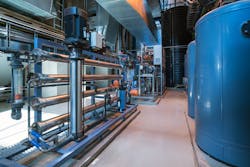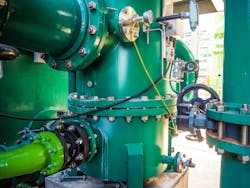Sources of reliable, high-quality water are essential for power generation. Whether it’s being used in boilers, cooling towers or other power generating functions, the water must be highly pure. This ensures that the steam generation systems work at optimum functionality and reduces the use of boiler chemicals. Pure water also reduces erosion and corrosion of the power generation equipment.
Boiler systems: High purity water is critical to boiler system functionality, where highly pressurized steam is produced and sent to the steam turbine to create power. Contaminants in the boiler feedwater could cause significant damage. When calcium and magnesium compounds are present, for example, scale and deposits could form. This could lead to overheating, tube failure and significant equipment downtime for cleaning.
Cooling systems: Cooling systems require the most water in the power generation process. Unlike the water in the boiler system, which will be heated to create steam, water for cooling water towers and generator stator cooling systems must be kept at a consistently lower temperature. However, mineral deposits can do similar damage to cooling systems over time. Scale can affect the chemical makeup of the water and even cause plugging of the lines and nozzles essential to the cooling water system’s function. In addition, the chemical makeup of “drift,” the gaseous water vapor caused by condensation, is a concern, making water treatment essential for the health of the community.
Condensers: Once the steam is cooled into a much smaller amount of liquid, it can be recirculated. Unfortunately, condensate can often contain contaminants that cause corrosion, like iron oxide particles from plant equipment. Once the water is cooled, it should be demineralized before being added to the feedwater. This can be a costly and time-consuming process, but the benefits to the equipment far outweigh the cost, as “polished” condensate leads to fewer breakdowns and optimal functionality.
Boiler makeup water systems: Boiler makeup water is what is left over after running through the boiler. Though it makes up a much smaller amount of liquid than the feedwater, it tends to contain more impurities from the equipment. For this reason, boiler makeup water should be highly treated to ensure that contaminants don’t damage the system through corrosion, overheating and tube failures.
A caution about feedwater. It’s important to note that not all feedwater is treated prior to entering the boiler system. In large plants, filters cannot be used because the preheating process increases the temperature of the system significantly. In these systems, filtration takes place in the condenser, not the boiler. If a filter is advertised for use in boiler feedwater filtration, it would need to be used in smaller boilers and power generation plants where feedwater and equipment is not nearly as hot.
Commonly Used Filtration Systems
Reverse osmosis (RO) systems are commonly used in power generation systems because of their effectiveness at removing dissolved solids. The right RO system can reduce and remove very small organic particles from the water source before they make their way into the boiler, where damage and corrosion could occur.
Ultrafiltration, as the name suggests, provides an extra layer of ultrafine filtration to the power generation system. The process pushes water through small pores in the filter at low pressures, helping to remove silt, fine contaminants and even viruses. These filters are commonly used upstream from the RO system to produce the highest purity water.
Unlike ultrafiltration, which is designed to remove very fine contaminants, particle filtration removes solids larger than one micron. There are many different types of particle filters, designed for a variety of applications. In power generation, cartridge filters are commonly used and can be divided into two categories: Depth filters are thick and pleated, creating a twisting path that collects particles, while surface filters simply remove particles on the surface of the liquid.
Because there’s no time for downtime in a power generation system, self-cleaning filters can be extremely beneficial. These filtration systems can be customized to the size of your equipment and are designed to require no system shutdowns for cleaning. Self-cleaning filters can remove a wide range of contaminants and are commonly used to purify boiler makeup water.
Factors to Consider
Before selecting a filtration system, it’s important to consider all factors. First, determine the flow rate of the system, typically measured in gallons per minute (gpm). Not all filtration systems can keep up with the demand of high-flow power generation. RO filtration, for instance, may be a good fit for higher flow boilers and cooling water towers. Cartridge filters, on the other hand, may fill up quicker, requiring more downtime and maintenance. To avoid regular system shutdowns for cleaning and maintenance, consider self-cleaning filters or double filter systems instead.
How filters will be used, where they will be placed, and what will be filtered out are also essential factors to be considered. For example, larger power generation plants employ boilers with preheaters that prohibit the use of filters, while smaller plants can use an RO system, cartridge filter, or a combination of the two with little problem. For applications where fine particles and organic matter need to be removed, ultrafiltration may be the best fit, while other particle filters are designed to remove larger, undissolved solids.
From boiling systems to cooling towers and condensers, the need for high-purity water is critical for power generation. Without it, damage caused by overheating and corrosion could increase expenses and system downtime. Fortunately, there are many different filtration options, depending on flow rate, intended use, and which contaminants need to be removed.About the Author: Mark Ligon is the marketing manager at Commercial Filtration Supply, a distributor/supplier of industrial filtration products, including self cleaning strainers, bag filtration, cartridge filtration and replacement parts. At CFS, Mark engages with major filtration brands like Eaton, Titan Flow Control, Shelco, MAHLE and more. You can contact Mark by email at [email protected].





